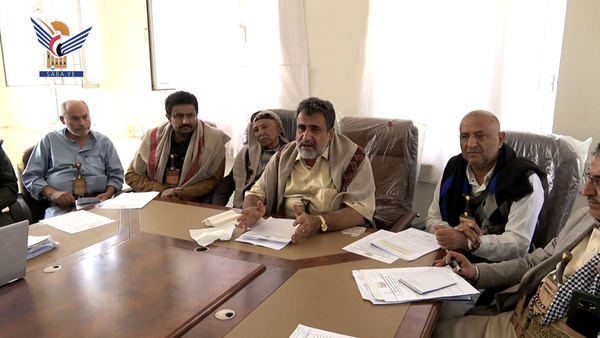
Sana’a - Sab:
The Executive Office of Bayda governorate, chaired by Governor Abdullah Idris, convened on Sunday to discuss strategies for enhancing financial resources and monitoring the implementation of development projects.
The meeting, attended by the governorate’s deputies—Abdullah al-Jamali, Saleh al-Mansouri, Ahmed al-Saiqal, Nasser al-Wahbi, and Nasser al-Aji—reviewed the leadership’s mobilization plan and reaffirmed continued support for the Palestinian cause as the central issue of the nation.
Participants heard a report from Nasser al-Mansouri, Director of the Finance Office, on the annual allocation estimates for local and shared resources for the fiscal year 1447 AH.
The session also included a report by Fadl al-Awadhi, head of the Civil Service Sector, on job discipline levels and plans to improve employee performance.
Mohammed al-Muqbali, head of the Governorate’s Planning Sector, delivered a report on the progress of development and service projects, as well as ongoing community initiatives.
The Executive Office also reviewed a memorandum from the Minister of Electricity, Energy, and Water regarding the collection of local authority fees, the Cleanliness Fund, and the debts owed by government agencies to the General Electricity Corporation—obligations that must be met to ensure the Corporation’s continued operations.
Governor Idris directed all concerned authorities to settle their outstanding debts to the Electricity Corporation. He emphasized the need to enhance performance across executive and service offices and to strengthen inter-agency coordination to address current challenges.
He stressed the importance of translating the directives of the Supreme Political Council and the Government of Change and Reconstruction into actionable executive plans and programs that help mobilize resources and improve both local and institutional performance.
Governor Idris reaffirmed the governorate leadership’s commitment to supporting the development process, which, he noted, requires unified efforts from both officials and the community to enhance service delivery. He underscored the need for all parties to assume responsibility in raising awareness and mobilization efforts, especially given the critical phase the nation is currently undergoing.
The Executive Office of Bayda governorate, chaired by Governor Abdullah Idris, convened on Sunday to discuss strategies for enhancing financial resources and monitoring the implementation of development projects.
The meeting, attended by the governorate’s deputies—Abdullah al-Jamali, Saleh al-Mansouri, Ahmed al-Saiqal, Nasser al-Wahbi, and Nasser al-Aji—reviewed the leadership’s mobilization plan and reaffirmed continued support for the Palestinian cause as the central issue of the nation.
Participants heard a report from Nasser al-Mansouri, Director of the Finance Office, on the annual allocation estimates for local and shared resources for the fiscal year 1447 AH.
The session also included a report by Fadl al-Awadhi, head of the Civil Service Sector, on job discipline levels and plans to improve employee performance.
Mohammed al-Muqbali, head of the Governorate’s Planning Sector, delivered a report on the progress of development and service projects, as well as ongoing community initiatives.
The Executive Office also reviewed a memorandum from the Minister of Electricity, Energy, and Water regarding the collection of local authority fees, the Cleanliness Fund, and the debts owed by government agencies to the General Electricity Corporation—obligations that must be met to ensure the Corporation’s continued operations.
Governor Idris directed all concerned authorities to settle their outstanding debts to the Electricity Corporation. He emphasized the need to enhance performance across executive and service offices and to strengthen inter-agency coordination to address current challenges.
He stressed the importance of translating the directives of the Supreme Political Council and the Government of Change and Reconstruction into actionable executive plans and programs that help mobilize resources and improve both local and institutional performance.
Governor Idris reaffirmed the governorate leadership’s commitment to supporting the development process, which, he noted, requires unified efforts from both officials and the community to enhance service delivery. He underscored the need for all parties to assume responsibility in raising awareness and mobilization efforts, especially given the critical phase the nation is currently undergoing.